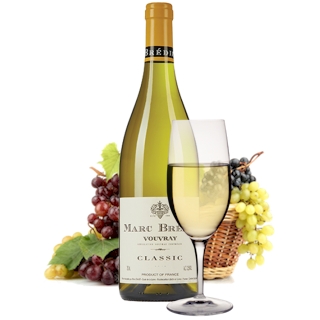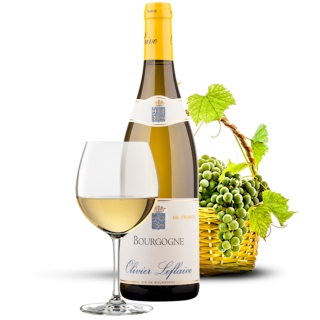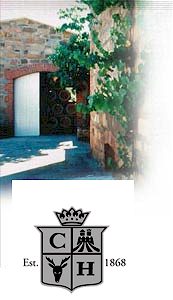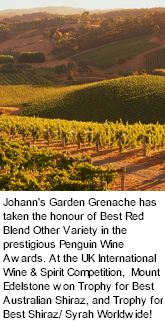


Johann Christian Henschke purchased land for a farm at Keyneton in 1861, after fleeing religious persecution in Silesia. He planted a small vineyard and an orchard, and after initially making wine for family consumption produced his first commercial vintage in 1868, believed to be principally riesling and shiraz. Each subsequent generation built upon the reputation for quality, but it was fourth-generation Cyril Alfred Henschke who in 1958 created the wine that has most captured the red wine world's imagination - Hill of Grace.

The original two-storey cellar, built into the side of the hill in time for the 1868 vintage, has been added to throughout the generations. Now covered with ivy, the stone building retains an old-world charm with its open fermenters and winemaking memorabilia on display. The estate's Mount Edelstone, Hill of Grace, Eden Valley and Lenswood vineyards produce the range of Henschke wines. Managed by viticulturist Prue Henschke, the superlative vineyards bear the fruit of her leading edge research and development. They vary from venerable dry-grown shiraz vineyards to the newer cooler-climate Lenswood vineyards supporting varieties such as pinot noir, chardonnay and merlot.
The original two-storey cellar, built into the side of the hill in time for the 1868 vintage, has been added to throughout the generations. Now covered with ivy, the stone building retains an old-world charm with its open fermenters and winemaking memorabilia on display. The estate's Mount Edelstone, Hill of Grace, Eden Valley and Lenswood vineyards produce the range of Henschke wines. Managed by viticulturist Prue Henschke, the superlative vineyards bear the fruit of her leading edge research and development. They vary from venerable dry-grown shiraz vineyards to the newer cooler-climate Lenswood vineyards supporting varieties such as pinot noir, chardonnay and merlot.
In 1839 Johann Menge, a German geologist, mineralogist and gardener explored and surveyed the regions around Adelaide in the new free colony of South Australia, on behalf of George Fife Angas and Colonel William Light. He travelled through the Barossa Range, giving names to the rivers and hills, including Mount Edelstein, which with time was anglicised to Mount Edelstone. The 40-acre Eden Valley vineyard, was planted to shiraz, probably sourced from Joseph Gilbert at Pewsey Vale. The original pre-phylloxera material most likely originated from the James Busby selection, which was propagated by Samuel Smith of Yalumba in the 1850s. What is surprising about Mount Edelstone is that it was planted purely as a shiraz vineyard.

Hill of Grace is surely is one of the most evocative phrases in the world of wine. For Henschke it is the name of both the vineyard and the wine that has so captured the heart of the red wine lover. The land was originally granted to Charles Flaxman in 1842 for £1 per acre. It was then sold by George Fife Angas to Nicolaus Stanitzki in 1873, for £480. Paul Gotthard Henschke purchased the vineyard in 1891. After his death his sons and executors Paul Alfred and Julius Philip Henschke arranged the transfer to Julius Philip, who had married into the Stanitzki family. In 1951 the property was purchased by Louis Edmund Henschke, a son of Paul Alfred Henschke, who worked the vineyard and property for nearly 40 years. The family continues to maintain the heritage.
The eight-hectare vineyard on the original 32-hectare block sits at an altitude of 400 metres, and has an average rainfall of 520 millimetres. It is situated on Parrot Hill, an isolated spot that was once an active village. Hill of Grace is planted predominantly to shiraz, but a surprise to many is that it also includes other varieties. Riesling, semillon and mataro/ mourvedre, with the sercial grape now only a distant memory. This diverse planting of several varieties in the garden, as the old Barossan growers called their vineyard, is typical - a sort of hedging their bets against the vagaries of mother nature. The whites are used in Eden Valley varietals, and the mataro...well, that's one of mother nature's later maturing varieties. It has gone into Hill of Grace at times, but usually it just doesn't ripen enough.
The Henschke Eden Valley Estate vineyard is located in the cooler part of the Mount Lofty Ranges, at an altitude of 500 metres and a rainfall of 700 millimetres. Cyril Henschke purchased the property from his son Kenneth Crossman Thyer in 1966, and established a large planting of predominantly riesling and shiraz at a time when riesling was scarce and bonuses were being paid by the large wineries. Today the riesling is the source of the Julius Eden Valley Riesling, named in honour of great-uncle Julius Henschke, a highly acclaimed artist and sculptor, while the shiraz is used in the Keyneton Estate Euphonium blend. This wine is named after the early English pioneer Joseph Keynes who settled at Keyneton in 1842 and after whom the village was named.
What sets Henschke wines apart, is the energy in the glass. There is no wine like Hill of Grace anywhere, and the Henschkes work at the top of their form, to infuse every bottle of each label with the unique energy from their historic vineyards. There are few wines in the world that can surpass Henschke.
